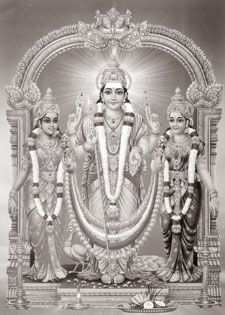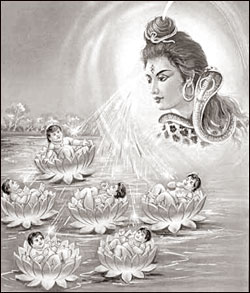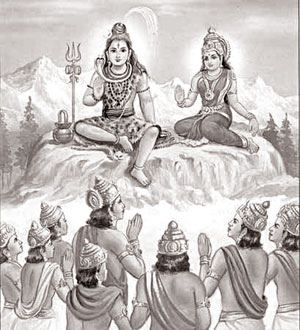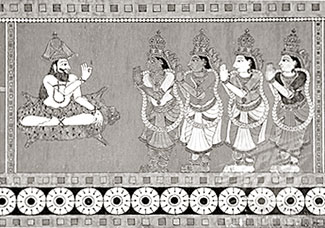|
HINDUISM
Hindu idea of God
Sinnathamby Rasiah
The existence of God and His
attributes
According to Saiva Siddhanta Philosophy the universe is
differentiated as he, she and it that undergoes the changes of origin,
development and decay, it is an entity created by an efficient cause. It
undergoes resolution. It is again reproduced.
|

God is evident in the natural order |
In fact the existence of God is made clear even to a lay mind from
the universe itself. It does not require any religious acumen or
spiritual realization to investigate into.
This however is external evidence, which no doubt, we are bound to
accept under the existing order of things that guide us in our routine
of life. But there is the internal evidence, supposed to be strong proof
in support of the theory. There were Mahans, who have realized God in
their heart of hearts who have seen Him and enjoyed directly and
spiritually and who had shown signs of their having so seen and enjoyed
the great God. Their evidence may be said to be far superior or to our
logical disquisitions and intellectual achievements. There is no doubt
we could see God more clearly and vividly through the immoral sayings of
saints like manikavasagar, Appa, Sundarar, Sambandar, Pattinattadigal
Thayumanavar Arunakiriyar and a host of others than through any amount
of our logical reasonings and philosophical inquiries.
God beyond intellectual grasp
God permeates the whole world and yet transcends our intellectual
grasp The existence of God is however an admitted truism with the vast
majority of mankind and it would therefore be the natural desire of
every sensible man to know something of God. It is not possible with our
limited knowledge to have anything like a concise idea of God, whose
nature is beyond the grasp of our intellect. This however is no reason
why we should not endeavour to know Him at least as far as our
intelligence would permit. It cannot be argued that we cannot have any
idea of God, because without knowing something of Him, it is not
possible to believe in His existence.
|

God transcends our intellectual grasp |
Although God is beyond the grasp of our intellect, still we know that
there is such a God, because we have come to know something of Him. It
behoves us therefore to acquaint ourselves of Him so far as we can-and
the only means at our disposal to acquire any knowledge of God is
material world around us. We can have some idea of God from the physical
world, though not fully because there are limitations and go beyond the
grasp of our intellect. However we are in a position to have some idea
of them, inferential from facts gleaned in the material plane and this
idea would materially help us in acquiring a knowledge of God to the
extent of our capacity.
God has no quality (Nirguna)
The religion calls God at times by the name of “Nirguna” (one without
quality). This has induced people to argue that no attribute can be
given to God. But this is a misconception. By “Nirguna” the religion
only means that God has none of the mayavic gunas known as satvarajas
and Thamas, which are within the range of limitation and this will not
go to show that God is possessed of no attributes whatever which would
ultimately mean that God is nonentity.
As already said it would be silly on our part, with our limited
knowledge to attempt at a definition of God; but at any rate a
definition though imperfect it may be, is necessary to enable us to
understand God to the best of our capacity, yet the Siddhanta philosophy
finds the following attributes to be the chief characteristics of God.
That He is Almighty; that He is omniscient; that He is omnipresent;
that He is omnipotent that He is absolute; that He is immutable.
His influence on the Universe
The question arises, if God is immutable how could the various
actions creation, preservation, destruction that take place from time to
time be attributed to Him. The Siddhanta doctrine on the subject is that
God neither wills nor thinks as we do. He is one sublime glow of
blissful intelligence in whose presence the various actions necessary
for the movement of the universe takes place, just in the same way as in
the presence of the Sun, one flower expands, another closes etc. Even
then it is not to be understood that the actions that take place in the
Divine presence disclose any signs of inconsistency. Although the
actions may differ in their forms yet the object is the same. The object
is the salvation of the souls and means adopted for the purpose may be
varied and diverse according to the conditions and capacity of the
souls.
In the presence of GOD the whole Universe expands and contracts as
circumstances require. He is the central figure around whom the
universe, every comer of which receives its due share of the Divine
influence.
Skanda Shasti fast
For everlasting peace and eternal prosperity:
Chelvathamby Maniccavasagar
The world today is suffering from over-specialization of material,
science and compartmentalization of knowledge and wisdom. Further, man
has completely forgotten his fundamental divine nature. As such, the
most urgent need of the hour is peace and love. Love brings about unity
of all mankind and this unity combined with spiritual knowledge will
undoubtedly bring world peace.
|

Lord Muruga |
With man’s vast knowledge in science and technology, material power
and prestige, there is an integral connection between the state of
individual and the state of the nation of world. They are dependent on
each other for their peace and eternal prosperity. Interdependence is
the hallmark of the world to achieve peace.
Peace is essential for everyone and Swami Vivekananda in his address
to the Parliament of Religion in America said that “man is a victim of
his own desires and is caught up in his passions of hatred and violence,
thereby forgetting his inner spiritual life of faith, love and harmony.
Skanda Shasti fast which is observed by Hindus for six days in
temples particularly in Murugan temples illustrate the conquer of a
Demon by the name of ‘Suran’ by Lord Muruga. Lord Muruga did not resort
to violence. Muruga used his ‘Gnanavel’ or spear. The Vel symbolizes
knowledge and wisdom. Vel is pointed at the top, broad in the middle and
deep in the bottom. This shows that man’s knowledge should be sharp, and
broaden and also he should be very humble in all his dealings.
|

Siva agrees to beget a son who will fight the Asuras. Six baby
boys are born from six rays from Siva’s Third Eye. |
In fact, Lord Muruga used his knowledge and wisdom which is known as
‘Gnanavel’ to conquer the Demon Suran. In the ‘Puranas’ good virtues are
personified as Lord Muruga and evil virtues are personified as Demon
Suran. This is to illustrate to the people the inner significance that
“the demonic desires, thought, word and deed of the Demon have been
defeated and it was a victory for the good virtues.”
Indeed, the Skanda Shasti fast is observed for six days with fervent
prayer, concentration and meditation on Lord Muruga. During this period,
devotees generally abstain from food and after the pooja in the evening
they have meal of fruit, milk or coconut water. The fast is called
‘Upavasam’ which means drawing oneself close to God where the mind is
detached from the material world for spiritual progress.
This fact is observed at Sivasupramaniam Temple at Slave Island,
Vinayagar Temple, Sivan Temple and Vishnu Temple at Modera and various
other Murugan Temples in Sri Lanka particularly at Kataragama.
On the sixth day of the fast is the grand festival of
‘Soorasamhaarom’ which is enacted outside the Murugan Temples. This is
the drama of the battle between ‘Asuras’ and ‘Skanda’. In fact, this
battle is between the animal nature of man and his Divine nature
culminating in the final conquer of Ego by knowledge and wisdom.
The Puranas extol Lord Muruga’s legendary origin. Devas, when they
proceeded to Mount Kailas to complain to Lord Shiva of their persecution
by the Asuras, found him in deep meditation. On being awakened, a Divine
spark emanated from his frontal third eye. This was received in lake ‘Saravanapoikai’.
There it was nurtured by the constellation pleiades (Karthikai) and
became six infants. They became one when they were fondly embraced by
Divine mother Goddess Parvathi. Therefore, he is also known as
Karthikeya.
|

Devas ask for Siva’s help to defeat Asuras |
Furthermore, Murugan as a valorous youth is said to have performed
several brave deeds including the imprisonment of Brahma and imparting
the meaning of the sacred word Aum to Lord Shiva. In due course he was
sent, accompanied by a large force, with Virapahu at the head, to
overcome the Asuras and release the Devas.
In fact, before the actual commencement of the battle, Virapahu was
sent as an emissary to persuade Sura Padman to lay down arms or release
the Devas. On the first day of the battle Bhanukopan, the eldest son of
the Asura chief, who offered combat was overcome. Then the lion faced
Sinhamukan a brother of Surapadman, who came to this aid was also
defeated. Upon which the Asura leader himself fought, assuming several
monstrous forms and shapes, finally he sought refuge in the form of a
mango tree.
He was ultimately defeated, but was not slain but accepted to serve
Muruga in the form of a peacock and also given a place in his banner as
a rooster cook. The Devas were released and they celebrated the victory.
The battle between Lord Muruga and Asuras is indeed a battle between the
Divineself and the Ego in man.
To maintain peace, tranquillity and serenity of the mind, we have to
get rid of desires and lead a life of detachment, faith and love. These
are the pillars on which peace rest. If there is righteousness in the
heart, there will be beauty in character. If there is harmony in home,
there will be order in the nation. When there is order in the nation,
there will be peace in the world.
As such, let us pray to Lord Muruga and receive His Divine Blessings
to lead a peaceful life.
Lord Shiva’s Game:
Thiruvilaiadal Puraum
Thilaka V Wijeyaratnam
In these series of mythological stories of God Siva. The various
playful acts of God Siva are dealt with. God Siva, tests, teases his
devotees and finally reveals Himself and bestows grace upon His devotees
in all seriousness.
During the reign of Kulotunga Pandyan, there was an old man who had
come to Mudurai from another land and setting down there taught sword
fighting to young men.
|

Murals of Thiruvilayadal Puranam, the collection of 64 stories
in Sri Meenakshi Temple’s wall near Golden Lotus tank in Madurai,
Tamil Nadu |
A young man called Sithan was one of his pupils. This young man
excelled in the art of sword fighting and being proud of his prowess, he
set up a school for sword fighting and taught the art to students. He
was even audacious enough to draw the students of his old master and
caused much misery to the latter.
On the days the old teacher was away from home, he would go to that
house and ask the wife whether she would accept him.
On one such day, he caught her by her hand and pulled her. She pushed
him away and locked herself in.
The lady uttered not a word to her husband. Being an ardent devotee
of God Siva, she played to Him who was worshipped as Somasundara God.
God Siva, knower of all things came in the guise of the old teacher
and spoke to Sithan thus, “Oh Sithan, you are young and strong and I am
old and feeble. Nevertheless I ask you to a sword fight. Come to the
boundary of the town. Let’s fight. The youngster was more than
delighted. They met at the appointed time and place. The sword fight
started, watched by many. They fought for some time. Then the old
teacher saying aloud, “Think of your ingratitude to your guru, your
tongue, your hand that touched. Your eyes that eyed wrongfully - try to
protect all these organs in your body,” he cut off the tongue, the hand,
the trunk and severed his head too. Then he disappeared.
Those who watched the scene in amazement went to the old teacher’s
house and inquired from his wife where the teacher was. She said, “He
has gone to the temple.” Just then the old teacher came. They asked him,
how he fought with that young man Sithan and cut his hands and neck. “We
searched for you. You were missing. So we came to see you here.”
At that the old teacher said, “I never did such a thing. Who would
have done this but our Somasundarar. It is His Thiruvilayadal (game).
Then his wife told them how the cheeky, ungrateful young man betrayed
his guru by trying to molest her. “I prayed to God Somasundarar to save
me.”
People understood why God Siva spoke the words “Your tongue that
spoke ungratefully, your hand that touched... were meaningful words
whereby God Siva referred to his misdeeds.
The news of the incidents reached the ears of the Pandya king. He
came with his retinue to the temple, worshipped God Siva as Somasundarar
saying, “He is the guardian of the destitute.” He sent the old teacher
and his wife on his elephant for all to see how God Siva protected them
and bestowed Grace upon them. |



